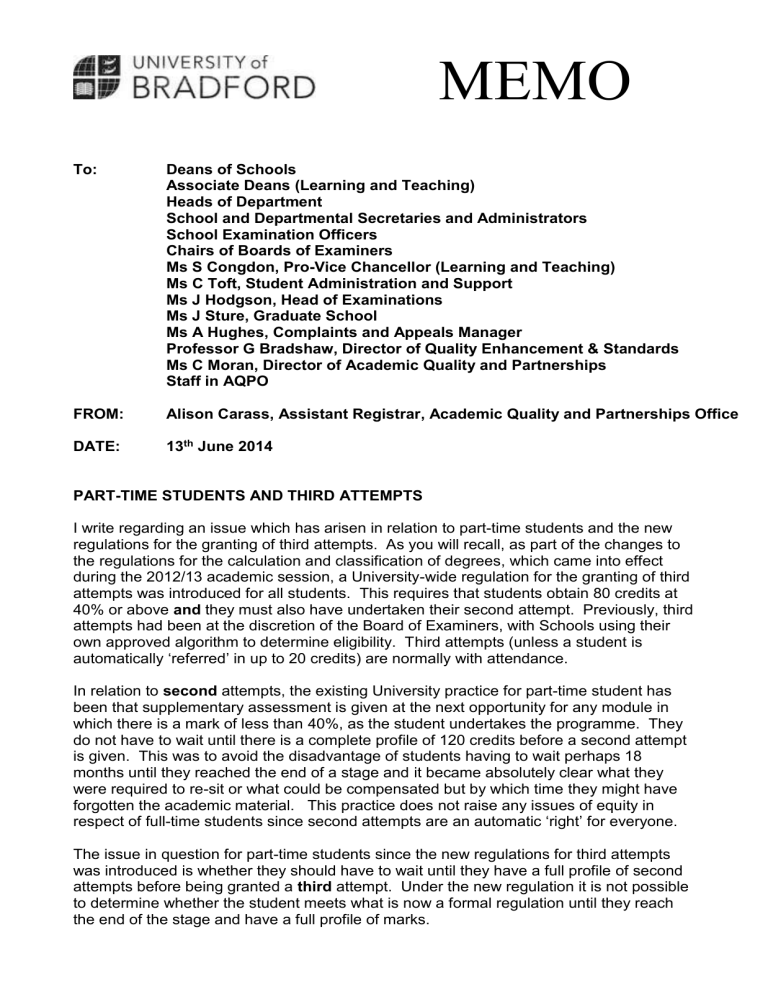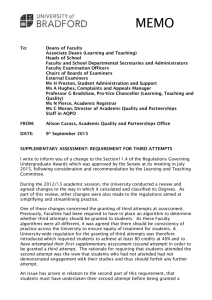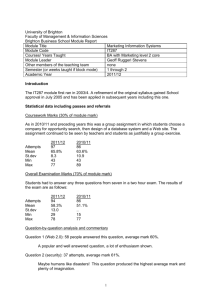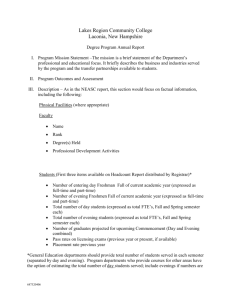ACADEMIC SECRETARY*S DEPARTMENT

MEMO
To: Deans of Schools
Associate Deans (Learning and Teaching)
Heads of Department
School and Departmental Secretaries and Administrators
School Examination Officers
Chairs of Boards of Examiners
Ms S Congdon, Pro-Vice Chancellor (Learning and Teaching)
Ms C Toft, Student Administration and Support
Ms J Hodgson, Head of Examinations
Ms J Sture, Graduate School
Ms A Hughes, Complaints and Appeals Manager
Professor G Bradshaw, Director of Quality Enhancement & Standards
Ms C Moran, Director of Academic Quality and Partnerships
Staff in AQPO
FROM: Alison Carass, Assistant Registrar, Academic Quality and Partnerships Office
DATE: 13 th June 2014
PART-TIME STUDENTS AND THIRD ATTEMPTS
I write regarding an issue which has arisen in relation to part-time students and the new regulations for the granting of third attempts. As you will recall, as part of the changes to the regulations for the calculation and classification of degrees, which came into effect during the 2012/13 academic session, a University-wide regulation for the granting of third attempts was introduced for all students. This requires that students obtain 80 credits at
40% or above and they must also have undertaken their second attempt. Previously, third attempts had been at the discretion of the Board of Examiners, with Schools using their own approved algorithm to determine eligibility. Third attempts (unless a student is automatically ‘referred’ in up to 20 credits) are normally with attendance.
In relation to second attempts, the existing University practice for part-time student has been that supplementary assessment is given at the next opportunity for any module in which there is a mark of less than 40%, as the student undertakes the programme. They do not have to wait until there is a complete profile of 120 credits before a second attempt is given. This was to avoid the disadvantage of students having to wait perhaps 18 months until they reached the end of a stage and it became absolutely clear what they were required to re-sit or what could be compensated but by which time they might have forgotten the academic material. This practice does not raise any issues of equity in respect of full-time students since second attempts are an automatic ‘right’ for everyone.
The issue in question for part-time students since the new regulations for third attempts was introduced is whether they should have to wait until they have a full profile of second attempts before being granted a third attempt. Under the new regulation it is not possible to determine whether the student meets what is now a formal regulation until they reach the end of the stage and have a full profile of marks.
It has been agreed that, in future, part-time students can continue to have second attempts at the next available opportunity, as currently, but they cannot be considered for third attempts until they have a complete profile of all their second attempts. The rationale for this is the principle that it would not be equitable for part-time students to be advantaged over full-time students by being permitted third attempts for which they might not be eligible. The University cannot disregard a regulation simply due to the mode of attendance of a student.
It should be noted that such students will already have been given two attempts at assessment, which they have failed. The University, therefore, should not be offering yet another attempt without having an opportunity to see their profile and determine whether this is in their academic interests. This is an academically sound stance to take and consistent with that for full-time students
All students, whether full or part-time, would be required to re-study any module in which they were granted a third attempt. This would address the issue of the study of the material being at an unacceptable distance from the assessment for students studying on a part-time basis.
Part-time students can also avail themselves o f the opportunity for ‘referral’ in 20 credits into the next stage, which is now automatically applied under the revised regulations.
Finally, in line with full-time students, part-time students who do not meet the requirements to pass and proceed into the next stage and who cannot be ‘referred’, must stop and make good outstanding credit with attendance at third attempt, if eligible. It would be expected that students studying on a part-time basis would cease to study any new material while they have their third and final attempt with attendance.
I would be grateful if you could disseminate the above information to all appropriate staff within your School.
I hope that this clarification makes sense but if it does not or you require any further help or information please do not hesitate to contact me on Ext 3897 or at a.j.carass@bradford.ac.uk
A copy of this memo can be found on the AQPO website at the following link: http://www.bradford.ac.uk/aqpo/documents-templates-and-downloads/ under the letter ‘M’ for Memo.







